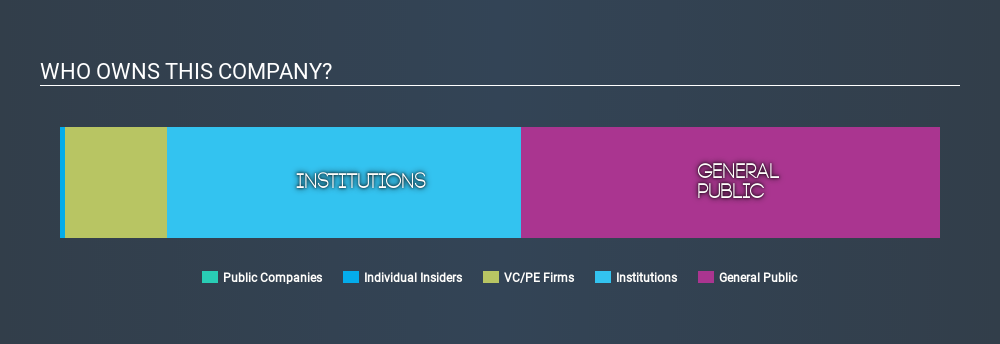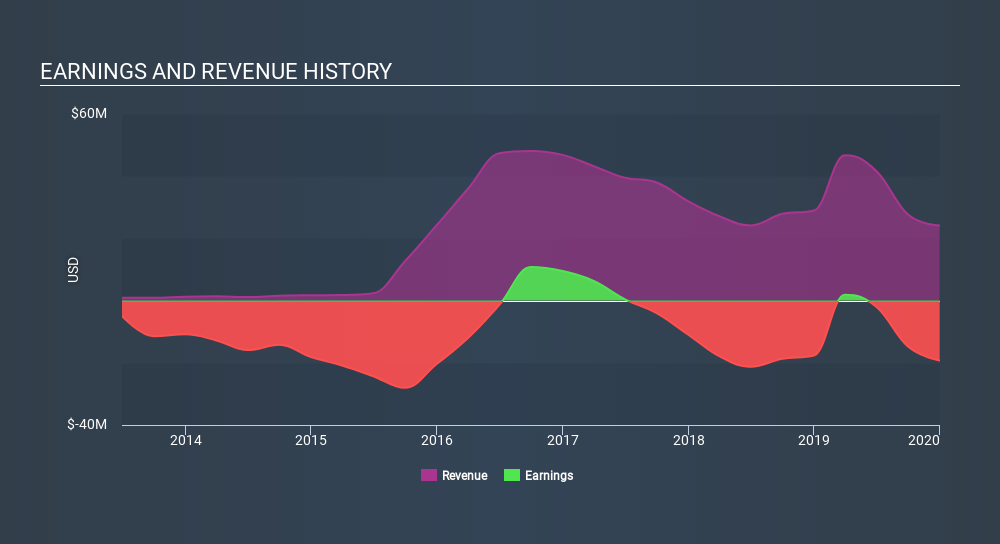- United States
- /
- Biotech
- /
- NasdaqGM:AGTC
What Kind Of Investor Owns Most Of Applied Genetic Technologies Corporation (NASDAQ:AGTC)?

The big shareholder groups in Applied Genetic Technologies Corporation (NASDAQ:AGTC) have power over the company. Generally speaking, as a company grows, institutions will increase their ownership. Conversely, insiders often decrease their ownership over time. We also tend to see lower insider ownership in companies that were previously publicly owned.
With a market capitalization of US$78m, Applied Genetic Technologies is a small cap stock, so it might not be well known by many institutional investors. In the chart below, we can see that institutions are noticeable on the share registry. We can zoom in on the different ownership groups, to learn more about Applied Genetic Technologies.
See our latest analysis for Applied Genetic Technologies

What Does The Institutional Ownership Tell Us About Applied Genetic Technologies?
Many institutions measure their performance against an index that approximates the local market. So they usually pay more attention to companies that are included in major indices.
Applied Genetic Technologies already has institutions on the share registry. Indeed, they own 40% of the company. This implies the analysts working for those institutions have looked at the stock and they like it. But just like anyone else, they could be wrong. If multiple institutions change their view on a stock at the same time, you could see the share price drop fast. It's therefore worth looking at Applied Genetic Technologies's earnings history, below. Of course, the future is what really matters.

Applied Genetic Technologies is not owned by hedge funds. Privium Fund Management BV is currently the largest shareholder, with 7.3% of shares outstanding. The second and third largest shareholders are InterWest Partners LLC and S.R. One, Limited, holding 5.9% and 5.7%, respectively.
Our studies suggest that the top 25 shareholders collectively control less than 50% of the company's shares, meaning that the company's shares are widely disseminated and there is no dominant shareholder.
Researching institutional ownership is a good way to gauge and filter a stock's expected performance. The same can be achieved by studying analyst sentiments. There are a reasonable number of analysts covering the stock, so it might be useful to find out their aggregate view on the future.
Insider Ownership Of Applied Genetic Technologies
The definition of company insiders can be subjective, and does vary between jurisdictions. Our data reflects individual insiders, capturing board members at the very least. The company management answer to the board; and the latter should represent the interests of shareholders. Notably, sometimes top-level managers are on the board, themselves.
Most consider insider ownership a positive because it can indicate the board is well aligned with other shareholders. However, on some occasions too much power is concentrated within this group.
Our most recent data indicates that insiders own less than 1% of Applied Genetic Technologies Corporation. It has a market capitalization of just US$78m, and the board has only US$506k worth of shares in their own names. Many tend to prefer to see a board with bigger shareholdings. A good next step might be to take a look at this free summary of insider buying and selling.
General Public Ownership
With a 48% ownership, the general public have some degree of sway over AGTC. This size of ownership, while considerable, may not be enough to change company policy if the decision is not in sync with other large shareholders.
Private Equity Ownership
With a stake of 12%, private equity firms could influence the AGTC board. Sometimes we see private equity stick around for the long term, but generally speaking they have a shorter investment horizon and -- as the name suggests -- don't invest in public companies much. After some time they may look to sell and redeploy capital elsewhere.
Next Steps:
I find it very interesting to look at who exactly owns a company. But to truly gain insight, we need to consider other information, too. For instance, we've identified 3 warning signs for Applied Genetic Technologies that you should be aware of.
If you would prefer discover what analysts are predicting in terms of future growth, do not miss this free report on analyst forecasts.
NB: Figures in this article are calculated using data from the last twelve months, which refer to the 12-month period ending on the last date of the month the financial statement is dated. This may not be consistent with full year annual report figures.
If you spot an error that warrants correction, please contact the editor at editorial-team@simplywallst.com. This article by Simply Wall St is general in nature. It does not constitute a recommendation to buy or sell any stock, and does not take account of your objectives, or your financial situation. Simply Wall St has no position in the stocks mentioned.
We aim to bring you long-term focused research analysis driven by fundamental data. Note that our analysis may not factor in the latest price-sensitive company announcements or qualitative material. Thank you for reading.
About NasdaqGM:AGTC
Applied Genetic Technologies
Applied Genetic Technologies Corporation, a clinical-stage biotechnology company, develops transformational genetic therapies for patients suffering from rare and debilitating diseases.
Mediocre balance sheet with limited growth.
Market Insights
Community Narratives




